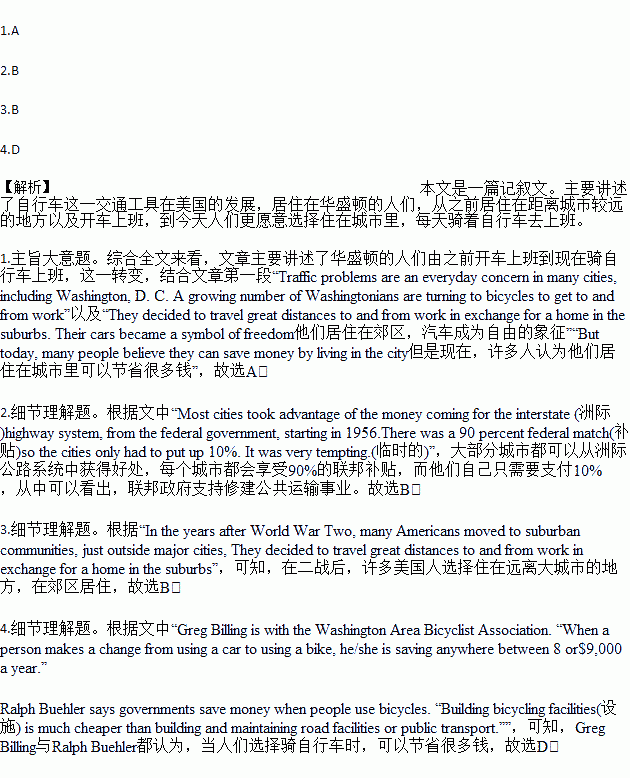题目内容
Traffic problems are an everyday concern in many cities, including Washington, D. C. A growing number of Washingtonians are turning to bicycles to get to and from work. In fact, the number of commuters who use bicycles has doubled in the city since 2007.
Ralph Buehler teaches urban planning at the Virginia Polytechnic Institute and State University,popularly known as Virginia Tech. He has written a book about urban biking, called City Cycling. He says there is a reason why urban bike tiding is now becoming more popular.
“Over the last 60 to 70 years, cities in America have been adapted to the automobile.”
“Most cities took advantage of the money coming for the interstate (洲际)highway system, from the federal government, starting in 1956. There was a 90 percent federal match(补贴)so the cities only had to put up 10%. It was very tempting.(临时的).”
In the years after World War Two, many Americans moved to suburban communities, just outside major cities, They decided to travel great distances to and from work in exchange for a home in the suburbs. Their cars became a symbol of freedom.
But today, many people believe they can save money by living in the city.
Greg Billing is with the Washington Area Bicyclist Association. “When a person makes a change from using a car to using a bike, he/she is saving anywhere between 8 or$9,000 a year.”
Ralph Buehler says governments save money when people use bicycles. “Building bicycling facilities(设施) is much cheaper than building and maintaining road facilities or public transport.”
Washington, D.C has also taken steps to protect bike riders. It approved a safe passing law and created areas on the road between cars and bikes.
The United States Census Bureau says 4% of the city’s workers ride to work by bike. The only city on the East Coast with more bike commuters is New York.
1.What does the writer mainly talk about in this passage?
A. More people in Washington, D. C go to work by bike
B. Bikes lead to new problems in Washington, D. C
C. Washington,
D. C has taken steps to protect bike riders
2.What can we know from Ralph Buehler’s statement?
A. A lot has been invested to build bicycling facilities in cities
B. The federal government supported building public transport
C. Cities didn’t use the money from the government wisely
D. Urban biking has been popular in the last 60 to 70 years
3.In the years after World War Two, many Americans prefer to_____.
A. go to and from work by bike B. live out of the major cities
C. travel long distances a lot D. rent houses rather than buy ones
4.What do Ralph Buehler and Greg Billing agree with?
A. Public transport develop too rapidly in recent years
B. Government should build more bicycling facilities
C. The cost of living in cities is lower than in the country
D. More people using bicycles can save money
 亮点激活精编提优100分大试卷系列答案
亮点激活精编提优100分大试卷系列答案
